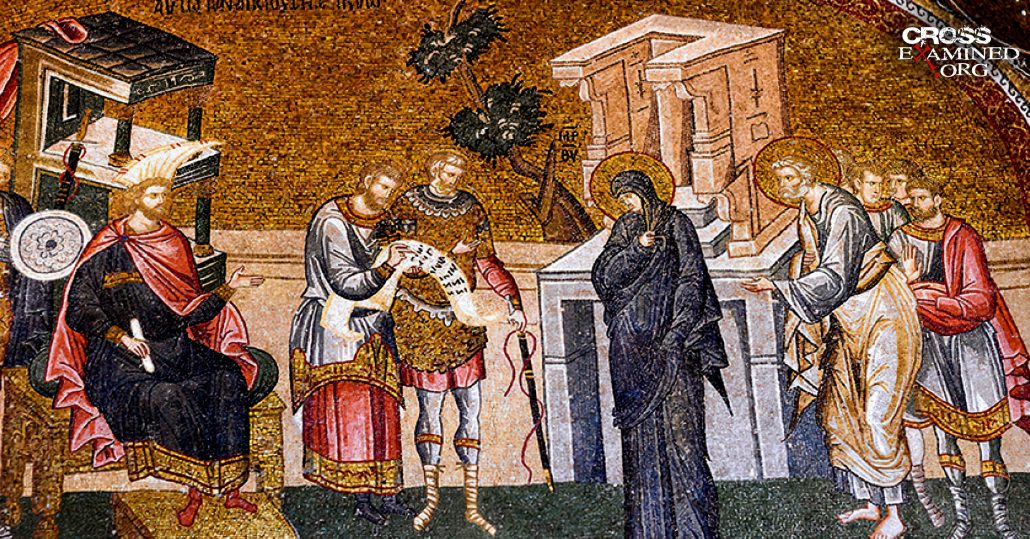Was Luke Wrong about the Census?
By Ryan Leasure
One of the more challenging texts in the Gospels is Luke’s reference to the census. We read in Luke 2:1-5:
In those days a decree went out from Caesar Augustus that all the world should be registered. This was the first registration when Quirinius was governor of Syria. And all went to be registered, each to his own town. And Joseph also went up from Galilee, from the town of Nazareth to Judea, to the city of David, which was called Bethlehem, because he was of the house and lineage of David, to be registered with Mary, his betrothed, who was with child.
So, why is this text difficult? It’s difficult because Luke places Quirinius’ census at the time of Jesus’ birth prior to King Herod’s death in 4 BC (Mt 2:1; Lk 1:5). Historical records, however, date Quirinius’ Syrian governorship from AD 6-9. This alleged historical discrepancy has led to objections of various kinds. These objections can be summarized into five main points:[1]
- Nothing is known of an empire-wide census during Augustus.
- No census would require Joseph to travel to Bethlehem.
- No census would have happened in Palestine during the reign of King Herod.
- Josephus only knows of Quirinius’ census in AD 6.
- Quirinius was not the governor of Syria during the time of Jesus’ birth.
Do these five objections prove that Luke was wrong about the census? Let’s consider each of them in turn.
Nothing is known of an empire-wide census during Augustus
This claim simply isn’t true. According to historical records, Augustus instituted at least three censuses.[2] We also know of other cyclical censuses that transpired across in the empire during this time period in places such as Syria, Gaul, and Spain.[3] If this is true, why couldn’t Augustus issue a census in Palestine for taxation purposes?
No Census would Require Joseph to Travel to Bethlehem
This objection assumes that Rome did not allow local regions to operate according to their own customs. We know, however, that Rome often allowed Israel to operate according to their own customs provided they didn’t cause too trouble for the Romans. For example, they were allowed to observe the Sabbath, maintain their temple, and opt-out of activities that violated their Jewish consciences.[4] With this in mind, it seems perfectly reasonable to think that Rome would allow the Jewish people to conduct an ancestral census per their customs (2 Sam 24).
Additionally, Joseph’s journey to Bethlehem coincides with the time period of Herod the Great’s reign. For if this census occurred in AD 6, Joseph never would have left Herod Antipas’ territory (Nazareth) to Archelaus’ territory (Bethlehem). A journey from Nazareth to Bethlehem for registration purposes only makes sense during an era when both towns were part of one jurisdiction. After Herod died, these territories were split up.
No Census would have happened in Palestine during the Reign of King Herod
This claim overexaggerates Herod’s power. After all, Herod was a puppet king for the Romans. Yes, he’s historically referred to as King Herod the Great, but let’s not forget that Caesar could have deposed him at any moment. Herod simply rose to power through some politically calculated moves on his part.
Furthermore, The Romans frequently conducted censuses in vassal kingdoms across the empire.[5] Palestine wouldn’t have been any different.
We also know that after Herod’s death, Roman taxes were slashed by 25% in Samaria under the rule of Archelaus, indicating that regular taxes existed in Palestine during the time of Jesus’ birth.
Josephus only knows of Quirinius’ census in AD 6
Josephus dates the Quirinian census to thirty-seven years after Octavian defeated Mark Antony at Actium in 31 BC. Thirty-seven years later places the census in AD 6.[6] Josephus also tells us that this census caused a significant revolt. Those who deny that a census took place during the birth of Jesus suggest that the AD 6 revolt was due to the fact that Rome had never conducted a census in Palestine such as this. But as has already been discussed, we have good reasons to reject that view.
Others suggest that the revolt occurred because Rome ignored the Jewish customs during the AD 6 census. Meaning, previous censuses were conducted in a way that satisfied the Jewish people. If this hypothesis is true, Josephus would have and no reason to comment on the Luke 2 census since it occurred without controversy. As with most historians, Josephus only writes about “newsworthy” events.
We must also note that just because Luke is the only one who testifies to this earlier census doesn’t mean that it didn’t occur. We have thousands of singularly attested events in ancient literature. Additional sources would certainly give us more confidence that those events occurred, but not having additional sources in no way proves those events didn’t happen. Let’s also bear in mind that Luke has proven himself to be meticulously accurate in his handling of facts that can be checked.[7]
Quirinius was not the Governor of Syria During the Time of Jesus’ Birth
If Jesus was born in 4 BC, and Quirinius wasn’t governor of Syria until AD 6, how can Luke be right about the timing of the census? Three solutions have been offered to this challenging objection.
First, many have suggested that Quirinius served as the Syrian governor twice. In fact, historical data leaves a governorship gap between 4-1 BC. Which means, we don’t know who served as governor of Syria during that time. The challenge with this particular view is that even if Quirinius filled the historical gap, his rule most likely would have come after Herod’s death. Yet this explanation could still work. Censuses were known to take several years. If the census began while Herod still reigned over Judea, the results might not have emerged until Quirinius’ reign so that his name was attached to the census.
Second, others argue that Quirinius was not the governor Syria during the Luke 2 census. Rather, he served in some administrative capacity – perhaps an overseer for the Syrian census. After all, Luke does not use the technical Greek word for “governor” in the text. Rather, he uses a verb which means “to rule, command, or lead.” In other words, Luke indicates that Quirinius was ruling in some kind of leadership capacity during this census. And since a census was a big job, it makes sense that someone would be appointed to oversee the project.
Third, some have proposed a different solution altogether. Instead of arguing from history, many have gone down the textual route by suggesting that the Greek word prote should not be translated “first” but “before.” If this is true, Luke is saying that the census took place before Quirinius was governor of Syria. But without getting too technical, this view is a stretch. It also seems odd for Luke to tell us that this event occurred before someone was governor. Why not tell us who the governor was at the time? Most scholars agree that “first” is the better translation.
Solution
Based on the above discussion, we don’t need to adopt the view that Luke committed a historical blunder on the Luke 2 census. We know that Rome conducted censuses somewhat frequently, and Jewish customs would have required Joseph to return to his native homeland.
Luke also indicates in Luke 2 that this was the “first” census. Meaning, he knew of a later census. And it just so happens he refers to that later census from AD 6 in Acts 5:31 – the one which led to a Jewish revolt.
But how do we reconcile a census during the rule of both Herod and Quirinius? It seems to me that the best explanation is that Quirinius was appointed as administrator of this earlier census. After all, Luke did not indicate that Quirinius was the “governor” of Syria, despite our English translations. He merely indicated that he “ruled” at that time. We know that he later became the official governor of Syria in AD 6. But as is the case with most people in political power, they usually have other positions along the way as they climb their way up the ladder.
While we can’t be historically certain on this hypothesis, we don’t need adopt the view that Luke made a mistake.
Notes
[1] Darrell Bock, Luke 1:1-9:50. Baker Exegetical Commentary on the New Testament (Grand Rapids: Baker, 1994), 903.
[2] Tacitus, Annals 1.11; Dio Cassius, Roman History 53.30.2
[3] Bock, Luke 1:1-9:50. 904.
[4] Josephus, Antiquities. 14.10.6, 20.
[5] Hoehner, H. W., Chronological Aspects of the Life of Christ cites 16 examples. Tacitus, Annals 2.42; 6.41
[6] Josephus, Antiquities. 17.13.5; 18.1.1.
[7] See Colin Hemer, The Book of Acts in the Setting of Hellenistic History.
Recommended resources related to the topic:
How Can Jesus be the Only Way? (mp4 Download) by Frank Turek
Jesus, You and the Essentials of Christianity – Episode 14 Video DOWNLOAD by Frank Turek (DVD)
Cold-Case Christianity: A Homicide Detective Investigates the Claims of the Gospels by J. Warner Wallace (Book)
The New Testament: Too Embarrassing to Be False by Frank Turek (MP3) and (DVD)
Why We Know the New Testament Writers Told the Truth by Frank Turek (mp4 Download)
The Top Ten Reasons We Know the NT Writers Told the Truth mp3 by Frank Turek
Counter Culture Christian: Is the Bible True? by Frank Turek (DVD)
Ryan Leasure holds a Master of Arts from Furman University and a Masters of Divinity from the Southern Baptist Theological Seminary. Currently, he’s a Doctor of Ministry candidate at the Southern Baptist Theological Seminary. He also serves as a pastor at Grace Bible Church in Moore, SC.












Leave a Reply
Want to join the discussion?Feel free to contribute!